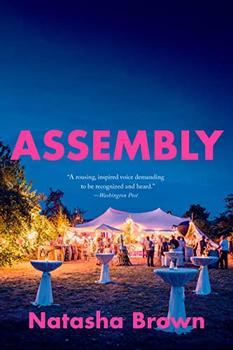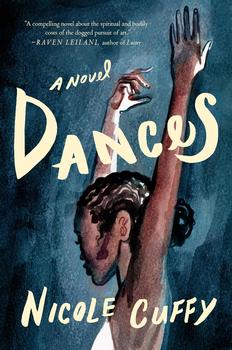Summary | Excerpt | Reviews | Beyond the book | Read-Alikes | Genres & Themes | Author Bio

Author Natasha Brown posits a provocative idea in her debut novel Assembly: Racism is cancerous. She tells the story of a Black British Jamaican woman in London, a striver who manages her toxic work environment by pretending racial insults and derogatory comments don't bother her. But the cost of soldiering on deteriorates her mental and physical health. The narrator is at the end of her rope when she says, "I'm ready to slow my arms. Stop kicking. Breathe the water in. I'm exhausted. Perhaps it's time to end this story." Therein is the fascinating theme of Assembly, a story told in vignettes: The idea that racism isn't a nefarious object to be overcome, but that it punishes us first and then kills us.
The unnamed narrator of Assembly delivers speeches resembling TED Talks to schoolgirls who marvel at her success. But her speeches are more performative than authentic. She privately wonders, "How many women and girls have I lied to? How many have seen my grinning face advocating for this or that firm, or this industry, or that university?"
She feels like a fraud despite her multiple established identities: an immigrant daughter, a banking professional, an achiever. The intersection of what she is supposed to have (success) and what she has to overcome (racism) creates imposter syndrome (see Beyond the Book). Haunting are the expectations: "Be the best. Work harder, work smarter. Exceed every expectation. But also, be invisible, imperceptible. Don't make anyone uncomfortable. Don't inconvenience. Exist in the negative only."
Even when she acts according to these expectations, she isn't safe, including from those of a lower economic class. She recounts a frightening experience of being called the n-word while waiting for the subway: "A panhandler at Aldgate, big guy, came up too close, and trapped me - between him and the steep drop down the tracks. He leaned right into my face and spat out those words. Then, laughing, he just walked away."
It is a weary life she leads managing harassment and microaggressions. When she is diagnosed with cancer and delays treatment, it feels ironic: She is othered by the whites in her office, who bring up how much they despise quotas. And then, by default and perhaps as a consequence of racial exhaustion, she others herself by not treating her diagnosis.
After reading about her negligence, I immediately thought of something Alice Walker wrote: "This life soon be over...Heaven last all ways." Walker wrote that line for her protagonist Celie in The Color Purple as something positive to hold on to in a bleak abusive situation. Although the heroines in Walker's novel and Assembly aren't very similar, they both struggle with the cruelty of men in addition to racism. Also, like Walker, Brown tiptoes her protagonist through episodic moments of haunting despair and suffocation.
What makes Brown's story so affective and effective is that she writes lovely passages of her narrator's conflict: her external success and internal doubt. At work, despite her $2,000 office chair and corner window, she is seen as nothing more than a diversity hire, which leaves her feeling powerless despite her achievements. And at home, her privileged white boyfriend diminishes her wounds, suggesting that his wealth is the same as her success. There is no escaping her invisibility.
Perhaps that is why Brown won't reveal the narrator's name, so we won't place her degrading experiences within personal parameters but institutional ones. The narrator herself is a bell hooks disciple, critical of the kind of colonialism from which she has prospered. She has an acute eye for social details and might be described as "woke," particularly as she dissects whiteness, diversity and her boyfriend's wealthy family, who politely grill her before feigning acceptance in a fake-liberal way reminiscent of the film Get Out and the social commentary that made it a global sensation.
I appreciated the vignette style of Brown's writing more than I expected to. Assembly feels like tiny pieces of light stitched together with a thread that at any moment could break apart. The author is inventive and historical and poetic. She has written a personal story of racial wounds.
Stylistically, the story feels like a memoir. It is written for a specific audience, one who accepts the narrator's premise of racism, disease and contempt. But it's more than that too. It's an immersive story that is brief but potent, one that shows what marginalized women experience in the dark moments of their workdays. It's a smart book that you can read on a rainy day in one sitting, one you will appreciate for its honesty. For the story it tells is a story that needs no explanation, either before or after. It stands on its own, a powerful work of art.
![]() This review was originally published in The BookBrowse Review in October 2021, and has been updated for the
September 2022 edition.
Click here to go to this issue.
This review was originally published in The BookBrowse Review in October 2021, and has been updated for the
September 2022 edition.
Click here to go to this issue.

If you liked Assembly, try these:

by Natasha Brown
Published 2025
Remember—words are your weapons, they're your tools, your currency: a twisty, slippery descent into the rhetoric of truth and power from a "powerful new voice in British Literature" (The Sunday Times).

by Nicole Cuffy
Published 2024
A provocative and lyrical debut novel follows a trailblazing Black ballerina who must reconcile the ever-rising stakes of her grueling career with difficult questions of love, loss, and her journey to self-liberation, from a sensuous new voice in fiction.
Your guide toexceptional books
BookBrowse seeks out and recommends the best in contemporary fiction and nonfiction—books that not only engage and entertain but also deepen our understanding of ourselves and the world around us.